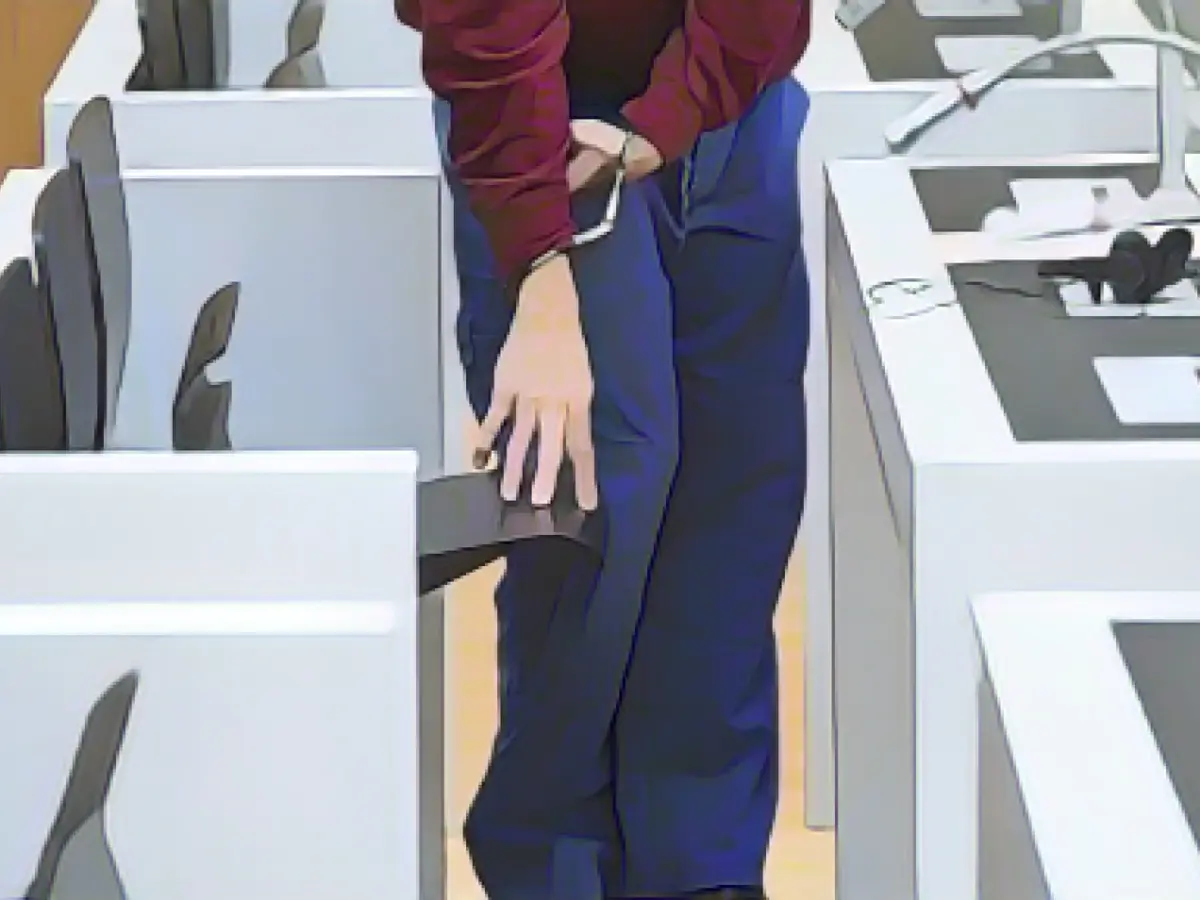Process - Grenade throw: "He knows he did the wrong thing"
It could have ended in a bloodbath what the public prosecutor's office believes happened at the beginning of June at the cemetery in Altbach, a community of 6000 people near Stuttgart: a 23-year-old throws a hand grenade in the direction of a mourning congregation. At the time, around 50 people were standing in front of the funeral hall, where they had just said goodbye to a young man. The fact that there are not many casualties on this day in early summer is only due to a lucky coincidence. The grenade ricocheted off a branch, landed 30 meters away from the group and exploded there. Nevertheless, at least 15 people are injured, some of them seriously.
Since Thursday, the alleged grenade thrower has been on trial in Stuttgart district court. A verdict is not expected before mid-March. The public prosecutor's office accuses him of attempted murder, the prosecutor speaks of an insidious and homicidal attack on the mourners: "He deliberately took advantage of the fact that the mourners were thinking about the deceased."
He then meticulously lists the damage caused in the cemetery by the many steel balls up to three millimetres in diameter that the explosion hurls through the air: They penetrate the arms, shoulders and thighs of the mourners, one of the bullets tears off a piece of the ear of a victim, another is hit in the neck by splinters. Another bullet lodged near a victim's lung. Several mourners had to be operated on and some still suffer from panic attacks and stress disorders to this day.
The defendant does not comment personally on the crime at the start of the trial, but allows his defense lawyer to make a statement. The charges are correct, says his lawyer Stefan Holoch - and then goes on to apologize to the 23-year-old: "He would like to apologize through me to all those who were harmed." His client knew that he had acted wrongly. "Very wrong."
The hand grenade throw also had massive consequences for the alleged perpetrator. When he tried to flee in a cab after the grenade was thrown, several mourners pulled him out of the car and brutally beat him. According to the public prosecutor's office, they jump and kick at his head and body until the first emergency services arrive, inflicting severe craniocerebral trauma on the Iranian and leaving him in intensive care for several days. The alleged thugs will stand trial from next week.
In the courtroom, the young man talks about his life, but often claims to have gaps in his memory. "I don't remember a lot of things," he says. He suffers from headaches and sleep disorders - whether these are a result of the traumatic brain injury remains unclear. He tells the court about other injuries to his head; a few years ago he fell eight meters, and the young man also mentions a tumor.
In 2006, he and his family fled from Iran to Germany. His father had been politically persecuted there and had fled the death penalty. In Germany, the now 23-year-old then attended German courses, obtained a secondary school leaving certificate and began various apprenticeships. His application for asylum was rejected and at the time of the alleged crime he was only tolerated.
According to the investigators, the background to the crime is a feud between two rival groups in the Stuttgart area that has been raging for many months. The accused belonged to a Kurdish group from the Stuttgart-Zuffenhausen and Göppingen area, said the public prosecutor. "He suspected numerous members or sympathizers of the hostile group at the funeral." According to the investigators, this group is mainly active around Esslingen.
The groups have been fighting each other for months and there have been repeated acts of violence in the Stuttgart area. People have also been shot at on several occasions. There have been incidents in Stuttgart-Zuffenhausen, Plochingen, Asperg in the Ludwigsburg district and Eislingen in the Göppingen district, among others. According to the State Office of Criminal Investigation, more than 40 arrests have been made so far.
For security reasons, the trial is taking place in the strictly secured hall of the Higher Regional Court in Stuttgart-Stammheim, dozens of emergency vehicles are parked outside the court building on Thursday and visitors are closely monitored at the entrance. It remains calm: members of the opposing groups do not show their faces.
Read also:
- Will he be convicted as Jutta's murderer after 37 years?
- He also wanted to kill his cousin
- With live stream! Gawkers film dying man
- Is Saarland threatened with economic collapse?
The alleged grenade thrower's actions were motivated by a long-standing feud between two rival groups, one of which he belonged to. This feud had been causing violence in various areas around Stuttgart, including Stuttgart-Zuffenhausen, Plochingen, Asperg, and Eislingen.
The public prosecutor's office in Baden-Württemberg considers the grenade throw a form of criminality, as the suspect intentionally targeted a mourning congregation. The defendant's lawyer acknowledged the charges, expressing his client's regret for his actions.
Despite the defendant's initial silence, his lawyer revealed that he suffered from memory gaps and various health issues, possibly due to the craniocerebral trauma he sustained following the beating he received from the mourners. This trauma had left him in intensive care for several days.
The trial is taking place in a secure hall of the Higher Regional Court in Stuttgart-Stammheim, with numerous emergency vehicles present and all visitors strictly monitored. This is due to concerns about potential violence from members of the opposing groups.
In this instance of craniocerebral trauma, the German public prosecutor's office is playing a key role in bringing those responsible for the attack to justice. This case highlights the need for authorities to address such forms of criminality, protecting innocent civilians and ensuring justice is served.
Source: www.stern.de








